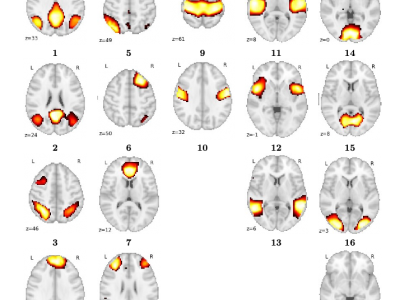Documents
Presentation Slides
HOW MANY FMRI SCANS ARE NECESSARY AND SUFFICIENT FOR RESTING BRAIN CONNECTIVITY ANALYSIS?

- Citation Author(s):
- Submitted by:
- Debadatta Dash
- Last updated:
- 22 November 2018 - 2:29pm
- Document Type:
- Presentation Slides
- Document Year:
- 2018
- Event:
- Presenters:
- Debadatta Dash
- Paper Code:
- BIO-L.4.2
- Categories:
- Keywords:
- Log in to post comments
Functional connectivity analysis by detecting neuronal coactivation in the brain can be efficiently done using Resting State Functional Magnetic Resonance Imaging (rs-fMRI) analysis. Most of the existing research in this area employ correlation-based group averaging strategies of spatial smoothing and temporal normalization of fMRI scans, whose reliability of results heavily depends on the voxel resolution of fMRI scan as well as scanning duration. Scanning period from 5 to 11 minutes has been chosen by most of the studies while estimating the connectivity of brain networks. In this study, we have demonstrated that Dictionary Learning (DL) based rs-fMRI analysis, due to its inherent sparsity constraint-based matrix factorization property, can identify all the functional networks efficiently even with a limited number of scans. Preliminary results demonstrate that a scan of 1 minute is sufficient for DL to produce all the networks with better accuracy, computation, and reliability than existing methods.

